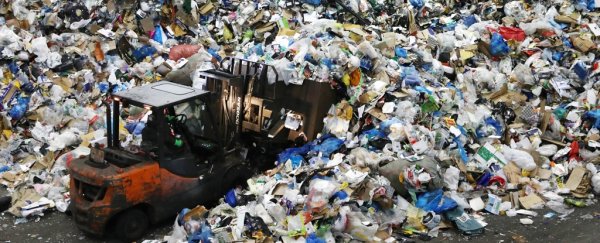Humanity's vast problem with single-use plastics doesn't come out of nowhere.
Before this avalanche of transient, throwaway waste is disposed of in landfill or by burning – unless it finds its way into the natural environment – somebody gets paid to produce it, making money by bringing this inevitable pollution into existence.
Now, we know who those somebodies are. In a first-of-its-kind report, researchers built an index identifying the top 100 polymer producers worldwide manufacturing single-use plastics that ultimately end up as waste.
Other researchers looking into this problem have sought to identify which brands are the worst contributors to plastic pollution (spoiler: it's Coca-Cola) by way of their packaging – but the plastic itself starts life elsewhere.
The new analysis – prepared by researchers at the Minderoo Foundation, an Australian philanthropic organization – goes deeper into the plastic supply chain, looking at the actual companies that make the polymers which comprise single-use plastics, such as Coke bottles and countless other 'throwaway' items, including plastic face masks.
Focusing on 'virgin' polymers sourced cheaply from fossil fuels – which make up about 98 percent of all polymer production – the researchers identified approximately 1,200 production facilities globally that make the five main polymers in single-use plastics: polypropylene (PP), high-density polyethylene (HDPE), low-density polyethylene (LDPE), linear low-density polyethylene (LLDPE), and polyethylene terephthalate (PET).
Those 1,200 facilities are owned and operated by about 300 distinct companies, the researchers say, but the top 100 are by far the biggest contributor to the overall problem, producing about 90 percent of all single-use plastic waste generated globally.
Amongst this notorious field, the top 20 occupy the heart of the crisis. These 20 polymer-producing companies – led by the US-based ExxonMobil and Dow, with China-based Sinopec in third place – account for about 55 percent of single-use plastic waste globally, which in total amounted to over 130 million metric tons of waste in 2019.
The top three companies alone manufactured about 16 percent of this, each producing more than 5 million metric tons of waste – but the primary producers of the plastic problem largely escape notice, the researchers say.
"Today, regulation is largely aimed at the tens of thousands of companies that sell finished goods using single-use plastics," the authors write in the report.
"A more effective solution would be to tackle the waste plastic crisis via the polymer producers at the base of the supply chain, which are relatively few in number. Improvements at this stage would cascade through the supply chain, with a disproportionate impact on circularity and plastic pollution."
In addition to indexing the polymer producers behind the plastic crisis, the researchers also identified the top 100 equity owners of the polymer producers (whether national states, such as Saudi Arabia in the #1 spot, or private institutions) and also the top 100 banks that finance polymer producers – the top five of which are all banks based in the UK or US.
Flow charts developed by the team reveal how ownership of polymer producers ultimately ends up impacting individual countries. Per capita, the biggest generators of single-use plastic waste are Australia, the US, South Korea, and the UK – with the most overall volume of waste ending up in China, followed by the US, India, Japan, and the UK.
"This is the first-time the financial and material flows of single-use plastic production have been mapped globally and traced back to their source," says study co-author Toby Gardner from the Stockholm Environment Institute.
"Revealing the sheer scale of the global crisis we have on our hands, it's critical we break the pattern of inaction."
Breaking that pattern won't be easy, given that the crisis – literally owned by state actors and hugely powerful private companies – is an "entrenched geopolitical problem", per the report, which makes several key recommendations for different sectors and stakeholders.
But the most important step, the researchers say, involves moving away from virgin polymer production – sourced from fossil fuels and responsible for huge amounts of greenhouse gas emissions – and instead using plastics made from recycled materials, which currently account for only about 2 percent of total plastic production.
"Just as disclosure of greenhouse gas emissions was the first step towards creating global targets for reductions, disclosure of funding for and production of single-use plastic is necessary to turn the tide on this escalating problem," former US Vice President Al Gore writes in a foreword to the report.
"With the Plastic Waste Makers Index as an essential baseline, policy-makers, industry and financial services companies can craft the steps necessary to move us toward a sustainable future."
The findings are available on the Minderoo Foundation website. The foundation was co-established by Andrew Forrest, chairman of Fortescue Metals Group.
